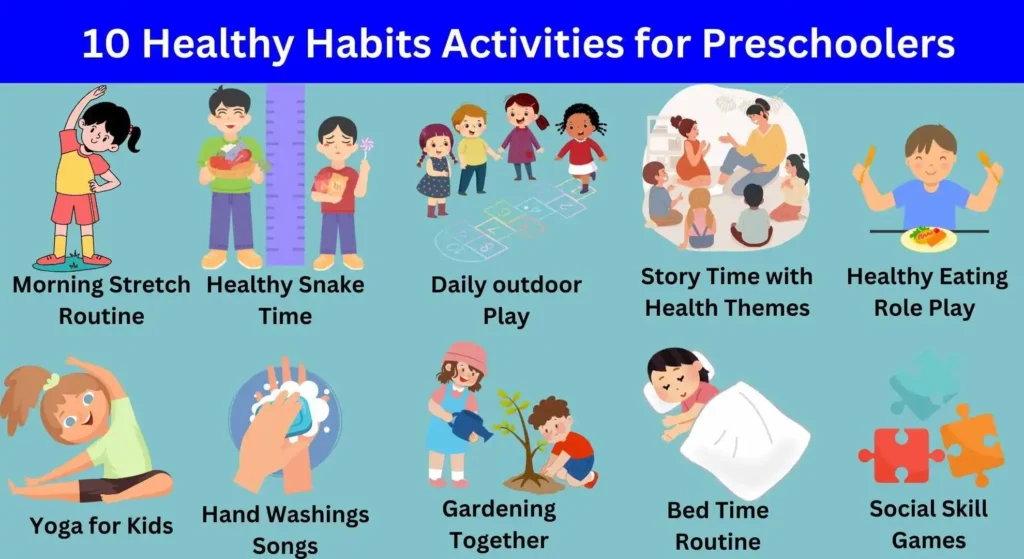Children learn habits at home, both through direct instruction and by observing the people in their lives.
Healthy habits include not only important eating habits but also hygiene, physical health, and mental health.
Engaging preschoolers in activities that promote healthy habits can profoundly impact their physical, cognitive, and emotional development.
Table of Contents
10 Healthy Habits Activities for Preschoolers
Let’s have a look at 10 engaging and effective healthy habit activities designed for preschoolers.

1. Morning Stretch Routine
Starting the day with a morning stretch routine is a fantastic way to instill good habits in preschoolers. This simple yet effective activity helps young children take care of their bodies, setting a positive tone for the rest of the day.
A morning stretching routine helps,
- Improve flexibility
- Increase blood circulation
- Body awareness
- Foundation for Good Habits
It not only helps them take care of their bodies but also instills a sense of discipline and awareness about physical health. By making stretching a fun and engaging activity, educators and parents can encourage preschoolers to build healthy habits activities that will benefit them for years to come.
2. Healthy Snake Time
Healthy snack time is an essential component of a preschooler’s day, providing necessary nutrients and energy for their active lifestyles.
It encourages children to make healthier food choices, helping them understand the importance of balanced diet and taking care of their bodies. François de La Rochefoucauld says,
“To eat is a necessity, but to eat intelligently is an art.”
This activity not only supports their physical growth but also lays the foundation for lifelong healthy eating habits.
3. Daily Outdoor Play
“In every walk with nature, one receives far more than he seeks.” – John Muir.
Outdoor play is vital for preschoolers as it encourages them to engage with their environment, stay active, and develop critical life skills. It provides a natural outlet for their boundless energy and curiosity, promoting a healthy lifestyle from an early age.
Outdoor play helps preschoolers,
- Appreciate nature
- Develop social skills
- Stimulates creativity and imagination
- Enhances their physical and mental development.
Daily outdoor play is a fundamental component of good habits for preschoolers. By integrating outdoor play into their regular routines, we can help children build good habits that will serve them well throughout their lives.
4. Story Time with Health Themes
It is a valuable activity that integrates education and entertainment and lays the foundation for a healthy lifestyle.
Story time with health themes engages preschoolers in learning about important topics such as nutrition, hygiene, and physical activity.
It serves as an engaging and educational tool to instill good habits for preschool children. Here’s why this activity is essential:
I. Educational and Entertaining
Health-themed stories provide a fun and engaging way to educate preschoolers about important health topics.
II. Building Healthy Habits
Through relatable characters and storylines, children can learn about the importance of brushing their teeth, cutting their nails, washing their hands, eating healthy foods, and exercising.
III. Emotional and Social Development
Stories often include themes of empathy, sharing, and cooperation. They teach children about social interactions and emotional health, contributing to their overall development.
IV. Parent-Child Bonding
Story time is a valuable opportunity for parents and children to bond. Reading together fosters a sense of security and builds a foundation for lifelong healthy habits.
5. Healthy Eating Role Play
Healthy eating role play involves children acting out different scenarios related to food and nutrition. This could include pretending to be chefs, grocery shopping, or running a restaurant.
Through these imaginative play sessions, children learn about various food groups, the importance of a balanced diet, and healthy eating practices.
Role play is a powerful educational tool because it engages children in active learning. By acting out scenarios, children are more likely to understand and remember the lessons.
As Albert Einstein once said, “Play is the highest form of research.”
Through play, children can explore new concepts and ideas in a hands-on and enjoyable way.
6. Yoga for Kids
Yoga for Kids is a modified version of traditional yoga that includes simple poses, breathing exercises, and fun activities tailored to young children. It focuses on making the practice enjoyable and accessible, helping children develop a positive attitude towards training and mindfulness.
The benefits of yoga for preschoolers involves
- Enhance physical health
- Boost mental well-being
- Improves focus and concentration
- Encourages self-esteem and confidence
As B.K.S. Iyengar, a renowned yoga teacher, said, “Yoga does not just change the way we see things; it transforms the person who sees.”
Introducing yoga to preschoolers can transform their approach to health and well-being.
7. Hand Washings Songs
Hand washing is one of the effective ways to prevent the spread of germs and illnesses. According to the Centers for Disease Control and Prevention (CDC), regular hand washing can reduce respiratory illnesses and infections.
Hand-washing songs transform a routine task into a fun activity. By singing a song that lasts 20 seconds, the recommended duration for effective hand washing, children learn to wash their hands properly while having fun.
As Plato once said, “Music gives a soul to the universe, wings to the mind, flight to the imagination, and life to everything.”
Music can make learning and practicing healthy habits enjoyable and engaging.
Creating a hand-washing song can be as simple as using a familiar tune with new lyrics. Popular melodies like “Twinkle, Twinkle, Little Star” or “Happy Birthday” can be adapted to include hand-washing steps.
8. Gardening Together
Gardening together offers a fantastic opportunity for children to learn about nature, healthy eating, and responsibility in a fun and interactive way.
Gardening exposes children to the natural world, teaching them about different plants, flowers, and vegetables. It provides hands-on experience with seeds, soil, and growth cycles, fostering a deeper connection with the environment.
Activities such as digging, planting seeds, and watering plants help children develop both fine and gross motor skills. These physical movements also promote coordination and strength development.
Gardening with preschoolers is about sowing seeds of curiosity, responsibility, and appreciation for the environment. Similarly, author and environmentalist Wendell Berry emphasized, “The Earth is what we all have in common.”
Teaching preschoolers to care for plants and the environment promotes responsibility and appreciation for nature.
9. Bed Time Routine
A structured bedtime routine sets the stage for a peaceful night’s sleep, which is essential for preschoolers’ growth. It is one of the healthy habits activities for preschoolers. As Dalai Lama said,
“Sleep is the best meditation.”
Start by engaging your child in calming activities before bedtime. According to experts, activities such as reading a bedtime story or gentle stretching can help transition from active play to sleep mode. Consistency in activities like reading, bathing, and calming exercises signals to the child that it’s time to wind down.
A bedtime routine encourages children to take responsibility for their care. As they learn the steps and what comes next, they begin to take pride in their independence and ability to complete tasks on their own.
Having a predictable series of steps before bed can reduce bedtime struggles and resistance. A regular routine helps them fall asleep faster and sleep more soundly.
10. Social Skill Games
Social skill games help preschoolers develop better communication skills. These games encourage children to express their thoughts, listen to others, and engage in meaningful conversations.
Through social interactions, children learn to understand and empathize with others. Games that require cooperation and teamwork teach kids to consider the feelings and perspectives of their peers.
Social skill games often involve problem-solving and decision-making. Children learn to negotiate, compromise, and find solutions to conflicts, which are essential skills for their future.
Effective Social Skill Games for Preschoolers,
I. Role-Playing Scenarios
Role-playing games allow children to act out different scenarios, such as playing house, going to the doctor, or visiting a grocery store.
II. Cooperative Board Games
Board games like “Snakes and Ladders,” “Candy Land,” or “Chutes and Ladders” teach children to take turns, follow the rules, and handle winning or losing gracefully.
III. Simon Says
“Simon Says” is a classic game that teaches listening skills, following instructions, and self-regulation. It requires children to pay close attention and respond appropriately to commands, enhancing their focus and concentration.
IV. Charades
Charades is a fun game that encourages children to use non-verbal communication. Acting out different actions or objects helps them understand body language and express themselves without words.
Conclusion
Incorporating healthy habit activities into preschoolers’ daily lives is essential for their overall development and long-term well-being. Whether it’s a morning stretch routine, healthy snack time, daily outdoor play, or social skill games, each activity offers unique benefits that encourage physical health, emotional resilience, and social skills.
Start incorporating these good habit activities for preschoolers into your child’s daily routine today and watch them thrive, grow, and develop into well-rounded individuals.
FAQs
How can I teach my preschooler good hygiene habits?
Teach good hygiene habits by making hand washing a fun activity, showing them how to brush their teeth properly, explaining the importance of regular baths, and leading by example with your hygiene practices.
How can I encourage my preschoolers to eat healthy foods?
Encourage healthy eating by making meals colorful and fun, involving your child in meal preparation, offering a variety of healthy options, and setting a good example by eating nutritious foods yourself.
What mental health activities are beneficial for preschoolers?
Beneficial mental health activities include practicing mindfulness through simple breathing exercises, encouraging imaginative play, reading together, and providing a supportive and loving environment where they feel safe to express their emotions.




